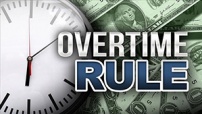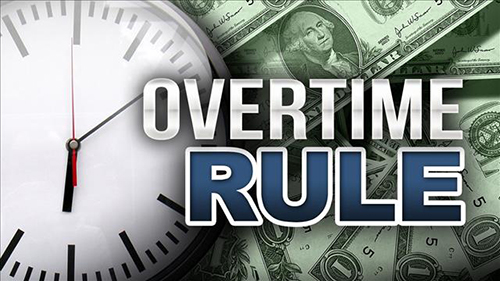
Court Enjoins DOL Overtime Rule on Nationwide Basis
Originally posted here, thank you to Timothy M. McConville, Esq. of Odin, Feldman & Pittleman, P.C. for this post! View the Loudoun Chamber position/press release, here
A federal court in Texas yesterday enjoined the United States Department of Labor from implementing and enforcing the DOL’s controversial new regulation revising white collar exemptions under the Fair Labor Standards Act. The court applied its injunction nationwide, preventing the DOL’s rule from becoming effective as of December 1, 2016, as the DOL had previously prescribed.
By imposing the requirement that white collar employees earn at least $913 per week, the DOL’s rule would have categorically excluded from the white collar exemptions employees who earn less than $913 per week, irrespective of their job duties and responsibilities. The court held the DOL’s categorical exclusion to be unlawful.
 “With the Final Rule, the Department exceeds its delegated authority and ignores Congress’s intent by raising the minimum salary level such that it supplants the duties test. Consequently, the Final Rule…is unlawful. The Department’s role is to carry out Congress’s intent. If Congress intended the salary requirement to supplant the duties test, then Congress, and not the Department, should make that change,” District Judge Amos L. Mazzant wrote in his injunction order. Judge Mazzant is on the United States District Court for the Eastern District of Texas.
“With the Final Rule, the Department exceeds its delegated authority and ignores Congress’s intent by raising the minimum salary level such that it supplants the duties test. Consequently, the Final Rule…is unlawful. The Department’s role is to carry out Congress’s intent. If Congress intended the salary requirement to supplant the duties test, then Congress, and not the Department, should make that change,” District Judge Amos L. Mazzant wrote in his injunction order. Judge Mazzant is on the United States District Court for the Eastern District of Texas.
The DOL rule, published in the Federal Register on May 23, 2016, would increase the salary level at which executive, professional, and administrative employees must be paid to qualify as exempt from the FLSA’s minimum wage and overtime provisions under statutory exemptions for executive, administrative, and professional employees. The exemptions are also known as the “white collar exemptions.” Each white collar exemption requires that the employees have as their primary duties particular executive, administrative, or professional duties. Under the DOL rule, to be exempt under the white collar exemptions, employees would have to be paid a salary equal to the 40th percentile of weekly earnings of full-time non-hourly workers, based on Bureau of Labor statistics. Based on 2015 BLS data, the DOL’s rule would revise the salary level test to $913 per week, or $47,476 for a full-year worker, from the current level of $455.
The DOL rule enjoined by the court yesterday also included a mechanism automatically to update the salary thresholds every three years using published BLS data for the 40th percentile of weekly earnings of full-time non-hourly workers.
Employer organizations and various States challenged the DOL’s rule in multiple lawsuits, which were consolidated before Judge Mazzant. The State plaintiffs asked the court to enjoin implementation of the rule while the case was pending, arguing that implementation as scheduled by the DOL would cause irreparable harm to the States and employers generally. The DOL itself projected that, in the first year under the rule, 4.2 million workers who are currently exempt would become non-exempt and eligible for overtime compensation under the FLSA. The DOL estimated that the rule would cause a $1.28 billion transfer of income from employers to employees in the first year following implementation.
While the court’s opinion was categorical in stating that “the Final Rule . . . is unlawful,” the issue decided by the court was only whether a preliminary injunction should be issued, and the court’s ruling was not a final disposition of the case. As a practical matter, however, the decision may signal an impending demise of the rule because, having decided that the rule is unlawful for purposes of a preliminary injunction, the court may be unlikely to change its opinion on the point when it ultimately reaches the merits of the case. In addition, a new Secretary of Labor under a President Donald Trump may dramatically change the DOL’s course on the rule.
Timothy M. McConville is the practice group leader of the labor and employment group at the law firm of Odin, Feldman & Pittleman, P.C. in Reston, Virginia. Mr. McConville may be reached at 703-218-2119 or timothy.mcconville@ofplaw.com. Follow him at laborandemploymentlawcocktail.com and on Twitter @worklawguy.
To learn more about the Loudoun Chamber’s Public Policy initiative, click here.
